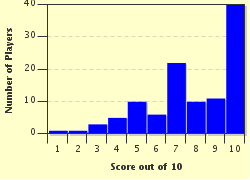Quiz Answer Key and Fun Facts
1. It was common for rabbis to use an abbreviated form of their name. What was Maimonides' real name?
2. Maimonides was many things: rabbi, philosopher, physician. He wrote many works. Which of these is considered essential to one who studies Kabbalah?
3. Modern-day Kabbalah took form in small, isolated Jewish academies of Medieval Europe (such as the Spanish cities Castile and Catalonia, and the Ashkenazi region along the Rhine River). Maimonides' teachings were also designed to contend with these early Kabbalists, a conflict that peaked with a mass burning of the book "The Guide for the Perplexed."
4. In "The Guide for the Perplexed" Maimonides wrote that man was created in the likeness of God not concerning men's physical bodies, but concerning God's Divine Intellect, of which man possesses a lower form, known as what?
5. Maimonides believed that it was best to approach the vast exploration of God after becoming proficient in scientific and philosophical studies. This would teach one methods of inference and how to recognize fallacies. What else did he say one should do when investigating matters of the Creator?
6. According to Maimonides, what was the reward given to Moses (from Exodus) for hiding his face from the glory of God upon Mt. Sinai?
7. Maimonides incorporated ideas from philosophy, Aristotle, physics, metaphysics, natural sciences, Islamic philosophy, early cosmology, and more, into his teachings.
8. Man is utterly ignorant, Maimonides states, of the methods and ways of God's eternal Wisdom. The rabbi believes this is because of what?
9. According to Maimonides, angels have free will and act consciously within the range of action entrusted to them (an angel of judgement acts freely within the realm of judgement). Humans likewise have free will and act consciously. The difference is that human actions are which stage of excellence?
10. Confusion and doubt can arise as one begins to question Creation and Purpose. In Maimonides' view, this is a result of two things. The first is man's mistaken notion that the universe and world were made solely for man's sake. The other is man's ignorance: of both the workings of the higher, spiritual realms and something else. Of what is man also ignorant?
Source: Author
Lorvanwa
This quiz was reviewed by FunTrivia editor
CellarDoor before going online.
Any errors found in FunTrivia content are routinely corrected through our feedback system.

